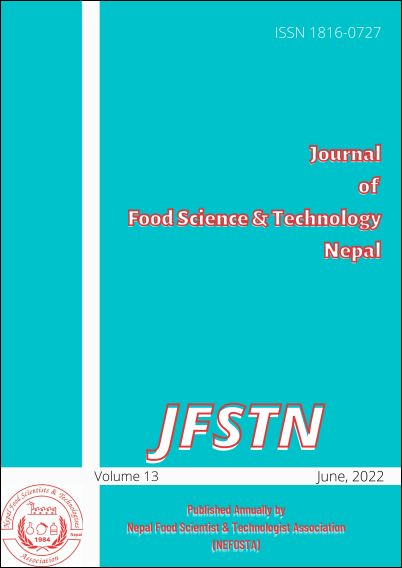Effect of roasting and soaking on Proximate Composition, Anti-nutritional, Antioxidant and Antimicrobial properties of Tamarind Seed Powder
DOI:
https://doi.org/10.3126/jfstn.v13i13.68497Keywords:
Tamarind, Proximate composition, Antioxidant activity, Antimicrobial activityAbstract
The research is primarily focused on analyzing the effect of different processing methods i.e. soaking (cold and hot) and roasting of the Tamarind indicaL. seed. Differently processed samples were subjected to analysis such as proximate composition, anti-nutritional factor, antioxidant activity, phenolic content and antimicrobial activity. Antinutritional factors i.e., tannins, alkaloid, saponin and phytate, were significantly affected (p ≤ 0.05) by different processing. Tannin, alkaloid, saponin and phytate content of samples were found in the range of 4.05-20.04 %, 3.22- 3.49 %, 0.5-1.04 and 2.10 - 2.92 % respectively. Free radical scavenging activity ranged from 16.07 ± 0.98% to 75.14 ± 1.34%, with all sample being significantly influenced (p ≤ 0.05) by the application of different methods. The phenolic content intamarind seed for samples were in the range of 9.55 - 52.33mg/100ml respectively. Total antioxidant capacity was found to be positively correlated with total phenolic content having R2= 0.9467. The antimicrobial test was carried out for Staphylococcus aureus, Bacillus subtilis, E. coli, and Salmonella typhi. Among the samples, roasted sample was found to be most effective against tested micro- organisms.
Downloads
Downloads
Published
How to Cite
Issue
Section
License
The author will be the copyright holder of this open access journal - 'Journal of Food Science and Technology Nepal (JFSTN)'.

